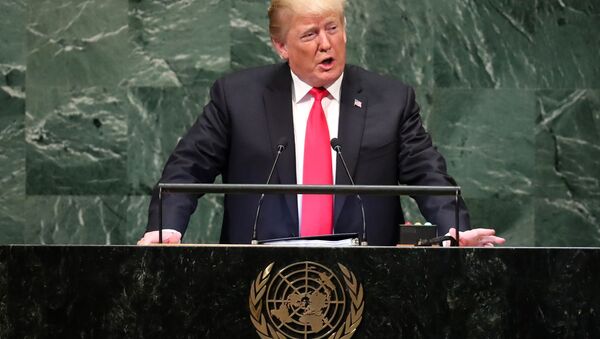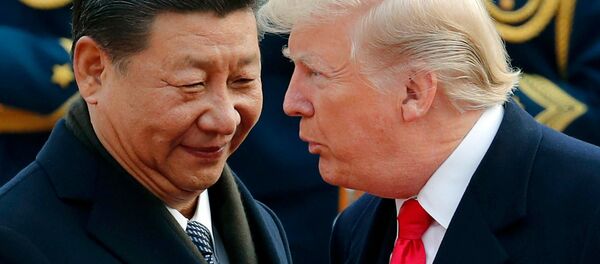Trump's accusations come as he imposed heavy trade tariffs on Chinese goods earlier this week. Accused of escalating a trade war, Donald Trump was undeterred as he threatened a further $267 billion of tariffs if China was to retaliate.
Donald Trump chaired a meeting of the UN security council at the UN General Assembly on Wednesday where he accused China of interference in the upcoming US mid-term election.
This comes as Donald Trump imposed heavy trade tariffs on Chinese goods earlier this week. Accused of escalating a trade war, Donald Trump was undeterred as he threatened a further $267 billion of tariffs if China was to retaliate.
Sputnik contacted Pauline Loong, Hong-Kong-based economist, for her views on Trump's rhetoric and economic war towards China
"Even today after all the high-level discussions that they've had that failed, the Chinese are still saying let's not rush things, let's not be emotional, let's have a cool head, let's negotiate. So China is still trying very hard to have a negotiated solution," she said in an interview.
However Pauline indicated that this was possibly the worse time for China to be facing a trade war with the US.
"They are preparing the nation for possibly tough times ahead. The reason is not just the tariff fight with the United States. This is possibly the worst possible time for China to have a fight with anybody at all because their own economy is in a very difficult position; they have a lot of domestic problems that they need to sort out — things that have been kicked down the road that they need to deal with now because they don't really want to kick it down the road any further," she told Sputnik.
"In 2021 it's the 100th anniversary of the Chinese Communist party and they really want to make sure that everything is humming along nicely by then. So everything is being done possible to ensure that the economy is staying on an even keel," she added.
Interestingly, when it came to Trump's accusations of Chinese meddling, she thought that far from being a genuine attack on China, his approach should not be taken at face value as he is simply appealing to his domestic audience.
"The important thing to remember is I don't think Trump is talking to the United Nations and I don't even think he is talking to China. He is talking to his own domestic constituents, to his supporters," she opined.
"As I see it he's trying to frame it as a false choice. If you do not vote for me, you are in effect, supporting China. That's what he is trying to do, which I suppose is quite a clever ploy. But it really has nothing to do with anybody else at all. This is domestic campaigning."
"I think Trump came to power because of rising nationalism in the United States. And it's not just the United States, it's worldwide. Over the past two years the world has seen Britain leaving the largest trading block, by exiting the EU. This was followed by Americans choosing a president who pledged to scrap all major trade deals and worldwide in country after country. Large constituencies have been voting for candidates who are against globalization," she said.
"So I don't think it's Trump leading the nationalism but there is a groundswell that Trump is tapping into and saying ‘I'm your champion, I believe in what you believe in, so support me'," she added.
The views and opinions expressed in this article by Pauline Loong are solely those of the speaker and do not necessarily reflect Sputnik’s position.





